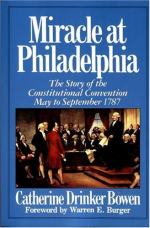
|
| Name: _________________________ | Period: ___________________ |
This test consists of 15 multiple choice questions and 5 short answer questions.
Multiple Choice Questions
1. Which delegate is born in Scotland and signs the Declaration of Independence?
(a) John Rutledge.
(b) Pierce Butler.
(c) John Dickinson.
(d) James Wilson.
2. Which delegate writes and publishes Letters from a Farmer in Pennsylvania to the Inhabitants of the British colonies?
(a) John Dickinson.
(b) Benjamin Franklin.
(c) James Wilson.
(d) Pierce Butler.
3. What motion does the Committee of the Whole approve before they adjourn on the last day of May?
(a) The motion that the President should be elected by popular vote.
(b) The motion that the national legislature should have three branches.
(c) The motion that the President should be elected for life.
(d) The motion that the national legislature should have two branches.
4. By the events of Chapter 11, how is the balloting taking place?
(a) Only in the Committee of the Whole.
(b) In the full Convention.
(c) Only in state caucuses.
(d) In smaller sub-committees.
5. What is the ever-present danger delegates do not discuss?
(a) There is never a quorum of delegates.
(b) The Convention dissolving and the project being abandoned.
(c) The choice of a single executive reminding people of the British monarchy.
(d) None of the New York delegates return once they leave.
6. What kind of veto power does the Convention delegates finally grant to the executive?
(a) Veto power subject to overrule by 1/2 of Congress.
(b) No veto power.
(c) Absolute veto power.
(d) Veto power subject to overrule by 2/3 of Congress.
7. What do delegates see if they visit Carpenters' Hall?
(a) Models of mechanical instruments.
(b) Freshly caught fish.
(c) Newly published poems.
(d) Fossil bones.
8. Why isn't the Convention called the Constitutional Convention?
(a) The Constitution is not written until after the Convention is over.
(b) The initial purpose is to revise the Articles of Confederation, not to write a Constitution.
(c) The Convention does not discuss the development of a Constitution.
(d) The Constitution is already drafted, and the Convention is held to discuss the draft.
9. Which delegate from South Carolina claims to have a plan similar to that presented by Edmund Randolph?
(a) Elbridge Gerry.
(b) James Madison.
(c) Charles Pinkney.
(d) John Adams.
10. Which delegate is elected chairman of the Committee of the Whole?
(a) Chancellor Wythe.
(b) George Washington.
(c) Nathaniel Gorham.
(d) Elbridge Gerry.
11. Why is no argument made against Hamilton's speech?
(a) The delegates agree with the clarity of his thinking.
(b) It is so extreme that no appropriate response or rebuttal is given.
(c) It appropriately addresses all of the concerns of the delegates.
(d) It is so vague that the delegates do not understand what he intends.
12. In Chapter 11, which delegate reminds the Convention that because the states are commercial, they continue to be engaged in European politics?
(a) Edmund Randolph.
(b) Governor Morris.
(c) Rufus King.
(d) Gunning Bradford.
13. Why does New Hampshire delay in sending delegates to the Convention?
(a) There are no delegates elected until after the Convention begins.
(b) The state government does not agree with the premises of the Convention.
(c) There is no money in the treasury to pay expenses.
(d) The delegates are all participating in the Congressional session.
14. Which issue tie up the Convention proceedings for days?
(a) How states are allowed to veto Congressional decisions.
(b) How states are to be represented in Congress.
(c) How states elect members of the Senate.
(d) How states are to be governed.
15. In Chapter Four, what issue does James Wilson see as the heart of the problem surrounding government?
(a) Is it be over men or over states?
(b) Is it modeled after the British form of government?
(c) Does it represent all states equally?
(d) Is it be decided at the Convention?
Short Answer Questions
1. What do the Virginia delegates do before a quorum of states arrive?
2. What two types of documents do Convention delegates have to guide their discussion of states' rights?
3. Why does Edmund Randolph oppose a single executive?
4. When they arrive, what is the most immediate problem for convention delegates?
5. Which late-arriving delegate is also governor of New Jersey?
|
This section contains 789 words (approx. 3 pages at 300 words per page) |

|




